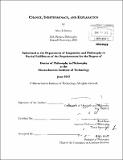| dc.contributor.advisor | Brad Skow. | en_US |
| dc.contributor.author | Emery, Nina R. (Nina Rebecca) | en_US |
| dc.contributor.other | Massachusetts Institute of Technology. Dept. of Linguistics and Philosophy. | en_US |
| dc.date.accessioned | 2012-09-13T19:02:32Z | |
| dc.date.available | 2012-09-13T19:02:32Z | |
| dc.date.issued | 2012 | en_US |
| dc.identifier.uri | http://hdl.handle.net/1721.1/72921 | |
| dc.description | Thesis (Ph. D. in Philosophy)--Massachusetts Institute of Technology, Dept. of Linguistics and Philosophy, 2012. | en_US |
| dc.description | "June 2012." Cataloged from PDF version of thesis. | en_US |
| dc.description | Includes bibliographical references (p. 97-101). | en_US |
| dc.description.abstract | This thesis is about the philosophical and scientific significance of chance. Specifically, I ask whether there is a single notion of chance that both plays a well-defined scientific role and proves useful for various philosophical projects. I argue that there is, but that this notion of chance is importantly different from the one that we usually come across in the philosophical literature. In the first chapter, "Chance, Indeterminacy, and Explanation", I argue against the common and influential view that chances are those probabilities that arise when the fundamental laws are indeterministic. The problem with this view, I claim, is not that it conflicts with some antecedently plausible metaphysics of chance, but rather that it renders the distinction between chance and other sorts of probability incapable of playing any scientifically significant role. I suggest an alternative view, according to which chances are the probabilities that play a certain explanatory role-they are probabilities that explain associated frequencies. In the second chapter, "Chance, Explanation, and Measure", I build on the view that chances are the probabilities that play a certain explanatory role by developing an account of non-fundamental chances-chances that arise when the fundamental laws are deterministic. On this account, non-fundamental chances are objective measures over relevant classes of alternative possibilities. In the third chapter, "Chance and Counterfactuals", I show how the sort of chances I have argued for can play an important role in a very different sort of philosophical project. According to a number of recent arguments, one consequence of our current scientific theories is that most ordinary counterfactuals are not true. I argue that the best response to these arguments makes use of the non-fundamental chances that I have argued for in the first two chapters of the dissertation. | en_US |
| dc.description.statementofresponsibility | by Nina R. Emery. | en_US |
| dc.format.extent | 101 p. | en_US |
| dc.language.iso | eng | en_US |
| dc.publisher | Massachusetts Institute of Technology | en_US |
| dc.rights | M.I.T. theses are protected by
copyright. They may be viewed from this source for any purpose, but
reproduction or distribution in any format is prohibited without written
permission. See provided URL for inquiries about permission. | en_US |
| dc.rights.uri | http://dspace.mit.edu/handle/1721.1/7582 | en_US |
| dc.subject | Linguistics and Philosophy. | en_US |
| dc.title | Chance, indeterminacy, and explanation | en_US |
| dc.type | Thesis | en_US |
| dc.description.degree | Ph.D.in Philosophy | en_US |
| dc.contributor.department | Massachusetts Institute of Technology. Department of Linguistics and Philosophy | |
| dc.identifier.oclc | 809109461 | en_US |
